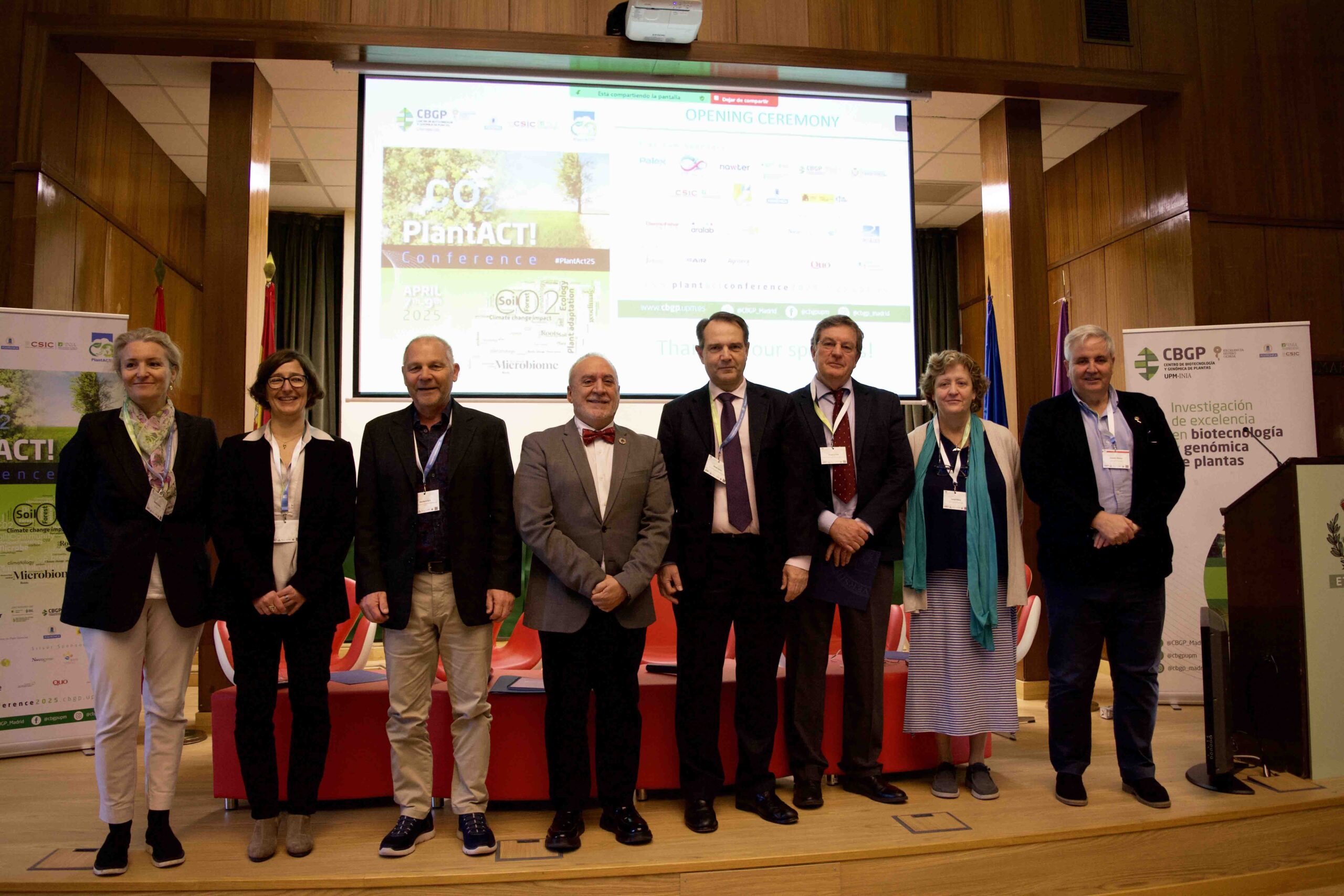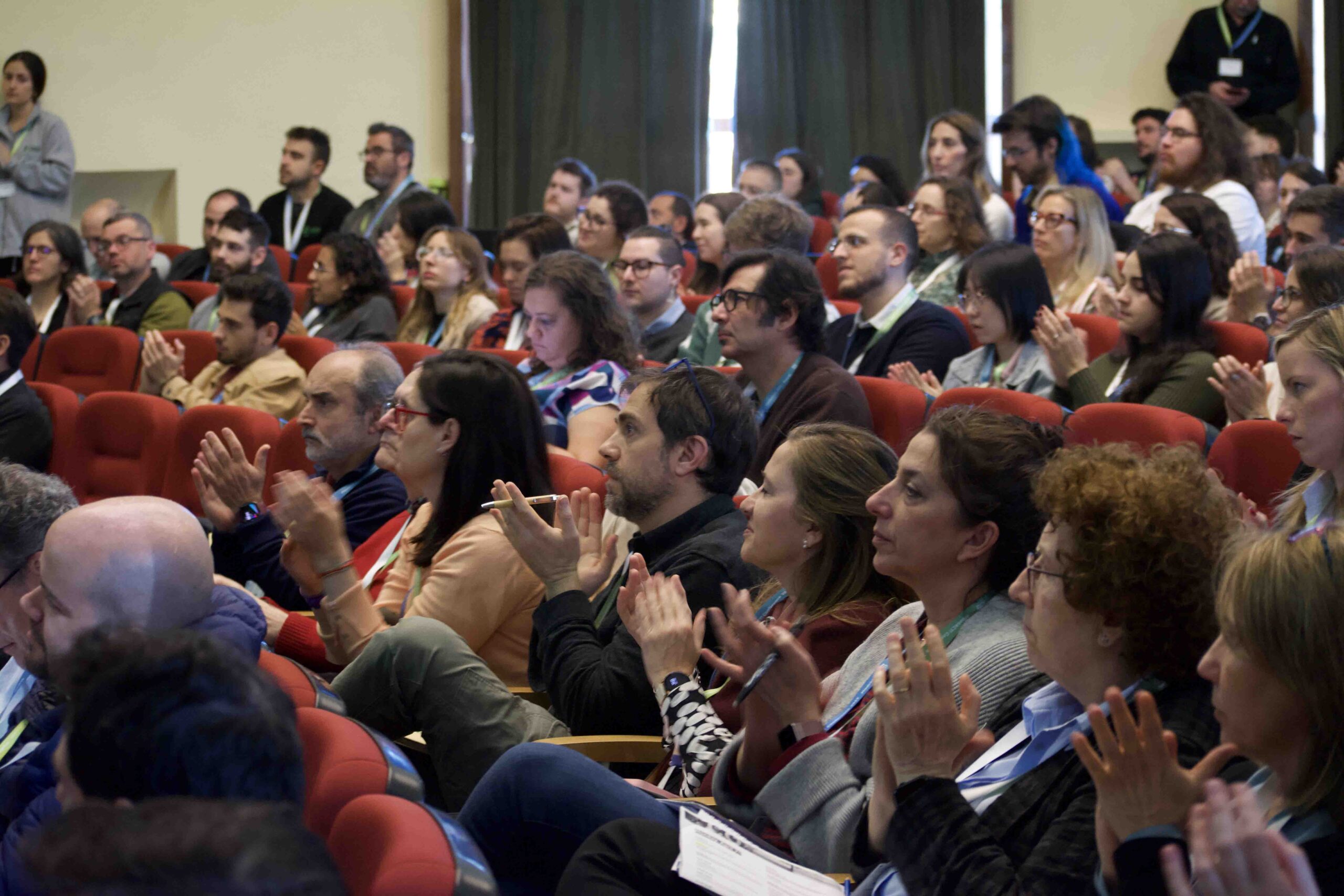More than 300 experts from 17 countries shared cutting-edge research, discussed climate action strategies and strengthened partnerships between science, policy and the private sector.
The international conference PlantACT! 2025, organized by the Center for Plant Biotechnology and Genomics (CBGP UPM-INIA/CSIC) and held April 7-9 at the School of Agricultural, Food and Biosystems Engineering (ETSIAAB) of the Polytechnic University of Madrid (UPM), exceeded all expectations. More than 300 scientists, policy makers, young researchers and private sector players gathered to exchange solutions based on plant science with the aim of mitigating the effects of climate change and guaranteeing food production in the future.


The event has established itself as a key platform for multidisciplinary and international collaboration and a forum for discussion and proposals for sustainable technological solutions. For three days, presentations, round tables, networking sessions and a science communication workshop provided a dynamic environment for the exchange of ideas and the generation of alliances.
“We have laid the foundation for an engaged international community with a clear vision. Our challenge now is to continue moving towards solutions that connect science, policy and society,” said Heribert Hirt, chairman of the PlantACT coalition at the closing of the event.


The event has established itself as a key platform for multidisciplinary and international collaboration and a forum for discussion and proposals for sustainable technological solutions. For three days, presentations, round tables, networking sessions and a science communication workshop provided a dynamic environment for the exchange of ideas and the generation of alliances.
“We have laid the foundation for an engaged international community with a clear vision. Our challenge now is to continue moving towards solutions that connect science, policy and society,” said Heribert Hirt, chairman of the PlantACT coalition at the closing of the event.
Science, technology and collaboration for a sustainable future
The event addressed four key themes: nitrogen use efficiency, soil and plant health, carbon sequestration and food resilience. Research presented included advances in plant biotechnology, soil microbiomes, and applications of artificial intelligence in sustainable agriculture.
The presentations by leading scientists such as Heribert Hirt, Gloria Coruzzi and Fernando Valladares aroused great interest, as did the flash talks by young researchers. Also noteworthy was the success of the science communication workshop, which reinforced the need to train scientists capable of connecting with society and political decision-makers.
Science, technology and collaboration for a sustainable future
The event addressed four key themes: nitrogen use efficiency, soil and plant health, carbon sequestration and food resilience. Research presented included advances in plant biotechnology, soil microbiomes, and applications of artificial intelligence in sustainable agriculture.
The presentations by leading scientists such as Heribert Hirt, Gloria Coruzzi and Fernando Valladares aroused great interest, as did the flash talks by young researchers. Also noteworthy was the success of the science communication workshop, which reinforced the need to train scientists capable of connecting with society and political decision-makers.
Connecting with the private sector and boosting transfer
One of the highlights of the meeting was the participation of representatives from the private sector, especially those interested in technologies for optimizing fertilizer use and regenerative agricultural practices. Possible avenues for technology transfer and financing of pilot projects were identified, opening the door to a real and proximate impact of the advances in scientific research presented at the conference.
Awards and recognition
One of the highlights of the closing ceremony was the award ceremony, which recognized the scientific excellence and social impact of the papers presented.
The prize for the best poster was awarded to researcher Enrico Tampelloni of the CBGP (UPM-INIA/CSIC) and the accesit to Mohamed-Amine Hamzaoui, from the Universidad Autónoma de Madrid.
The best flash talk went to PhD student Arturo Redondo López from CBGP (UPM-INIA/CSIC) for his presentation “Comparative transcriptomics reveals novel molecular mechanisms for metal tolerance in Poplar for phytoremediation applications” and the accesit to PhD student Varsa Shukla from the University of Cologne (integrated Cluster of Excellence in Plant Science, CEPLAS) for her presentation “Adaptative potential of sulfate content in Arabidopsis thaliana”, highlighting its clarity and rigor.
The awards were presented by Antonio Molina, scientific director of the CEX-SO Program of the CBGP (UPM-INIA/CSIC) and president of SOMMa, accompanied by a great support from the audience and special mentions by the organizing committee, which emphasized the future projection of the awarded works.
The next edition of PlantACT! will take place in 2027, with the aim of expanding the participation of countries from the global south and strengthening international collaboration.
All documentation of the event, including recordings, posters and presentations, will soon be available on the official PlantACT! website. Youtube channel of the UPM and CBGP.
Next steps: keeping the PlantACT! network active
PlantACT! 2025 has made clear the need for collective action, sustained over time and based on scientific evidence and contact with the productive sector and policy makers. The event has served as a turning point to strengthen a global network that will continue to grow for future editions.
“It has not only been an academic event, but also an engine to activate new collaborations and concrete actions,” said Molina.
More information:
